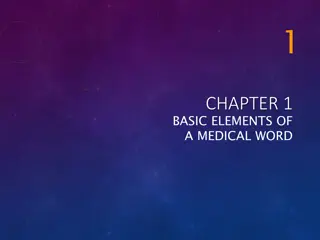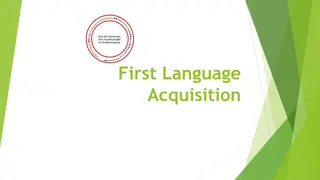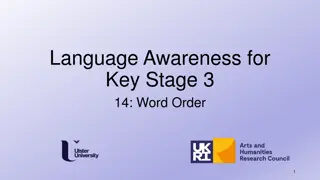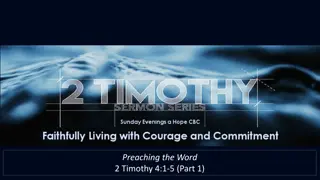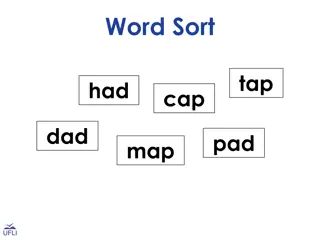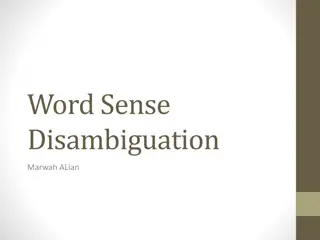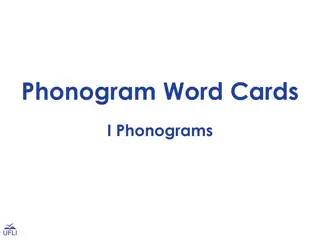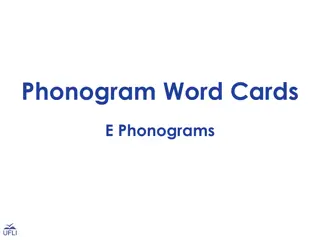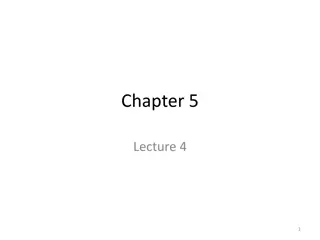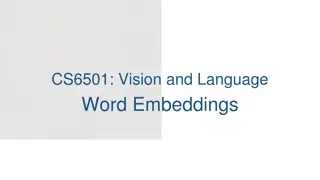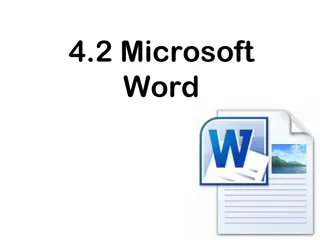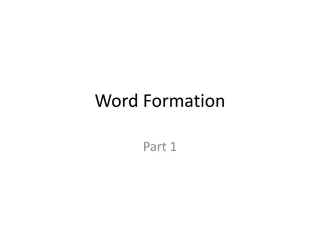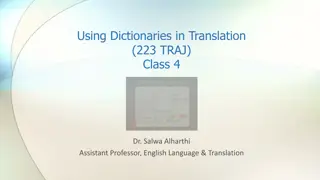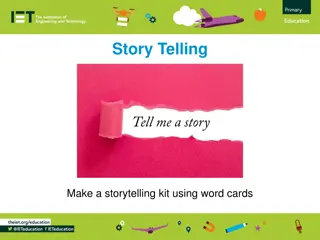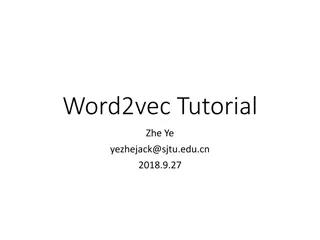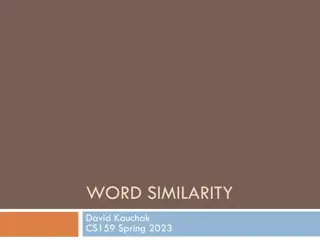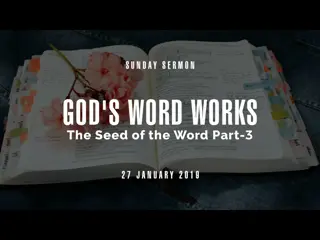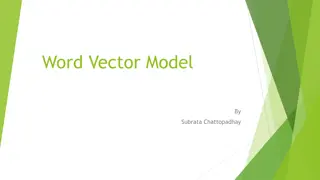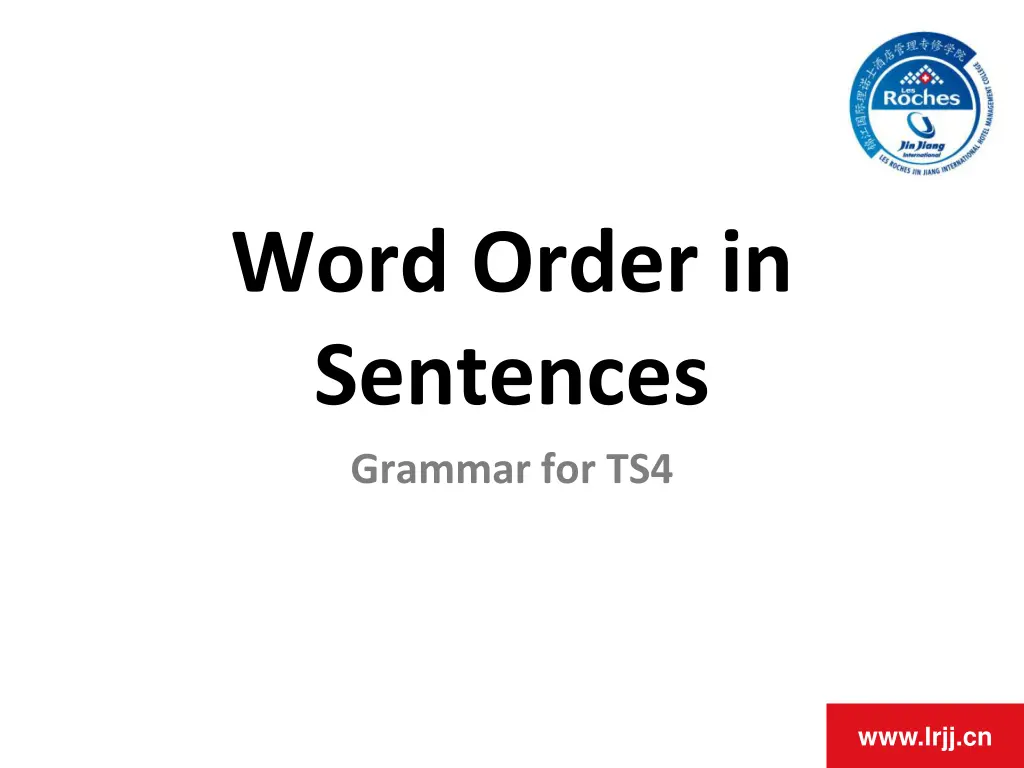
Understanding Word Order in Sentences: Essential Grammar Guide
Explore the fundamental elements of sentence structure, including the subject, verb, direct object, indirect object, and subject complement. Enhance your grammar skills with examples and explanations provided in this comprehensive guide. Master the art of constructing basic sentences with ease. Start your journey to improved language proficiency today!
Uploaded on | 1 Views
Download Presentation

Please find below an Image/Link to download the presentation.
The content on the website is provided AS IS for your information and personal use only. It may not be sold, licensed, or shared on other websites without obtaining consent from the author. If you encounter any issues during the download, it is possible that the publisher has removed the file from their server.
You are allowed to download the files provided on this website for personal or commercial use, subject to the condition that they are used lawfully. All files are the property of their respective owners.
The content on the website is provided AS IS for your information and personal use only. It may not be sold, licensed, or shared on other websites without obtaining consent from the author.
E N D
Presentation Transcript
Word Order in Sentences Grammar for TS4 www.lrjj.cn
Subject The subject is one of the main two parts of a sentence. According to traditional grammar, a sentence consists of two parts: a subject, a predicate which modifies the subject. Who: a person or a thing Example: Carol called. The bus returned. www.lrjj.cn
Verb The verb describes the action performed by the subject. It goes after the subject. Example: Carol called. The bus returned. www.lrjj.cn
Direct Object The direct object receives the action of the verb and answers the questions What? or Whom? The direct object should always stay with the verb. Example: Carol ate breakfast. The bus hit the tree. www.lrjj.cn
Indirect Object The indirect object answers the question "To whom?" or "For whom?". The indirect object is the recipient of the direct object. The indirect object is an object that often comes after a preposition. The indirect object should always stay with the verb or direct object. Example: Carol gave the timetable to Julie . www.lrjj.cn
Subject Complement The subject complement is something that completes the idea of the subject of a sentence by giving more information about it. Usually, the subject complement is a noun, a pronoun or an adjective. The subject complement should always stay with the linking verb (forms of verb to be, become, seem). Example: Jan is an excellent doctor. www.lrjj.cn
Basic sentences 1. Subject + verb Carol laughed. The dog sits and eats. The flowers bloom. www.lrjj.cn
Basic sentences 2. Subject + verb + direct object President Obama gave a speech. Jason told his mother. She wrote a letter. www.lrjj.cn
Basic sentences 3. Subject + verb + complement Our house is old. Jason was tired. This song seem familiar. www.lrjj.cn
Basic sentences 4. Subject + verb + indirect object + direct object I gave her my book. We offered them a drink. www.lrjj.cn
Word Order How Who What Where When Why www.lrjj.cn
Word order Not every sentence will have all these elements, there will be a selection of them in each sentence. www.lrjj.cn
Examples Who What Where When Why Carol ate on the train Where this morning because he was late. breakfast What Who Why The bus returned to the station to drop off the passengers Who What How The bus hit the tree with great force www.lrjj.cn
From small to large WHEN time, day, week The conference started at 10 am on Tuesday last week. WHERE place, city, country They live in a flat in a big city in India. www.lrjj.cn
Exception Sometimes a sentence starts with something else than the subject. The reason is emphasis. We want to stress this element by putting it at the front of the sentence. Your voice should emphasize it as well. This morning, Carol ate breakfast on the train. We use it only if it sounds natural! www.lrjj.cn
Common mistakes Separating Subject from the Verb. We two years ago bought this car. We bought this car two years ago. www.lrjj.cn
Common mistakes Separating the Verb from the Object. Sam ate slowly his meal. Sam ate his meal slowly. www.lrjj.cn
Common mistakes Mixing the order of WHERE and WHEN. We drove at weekends to the seaside. We drove to the seaside at weekends. www.lrjj.cn
Common mistakes Mixing the order of WHERE and HOW. He goes by train to work. He goes to work by train. www.lrjj.cn
Common mistakes Mixing the order of HOW and WHY. They contact everyone because it s easier by phone. They contact everyone by phone because it s easier. www.lrjj.cn
Common mistakes Mixing the order of WHEN and WHY. She went to town to post her letters this morning. She went to town this morning to post her letters. www.lrjj.cn

